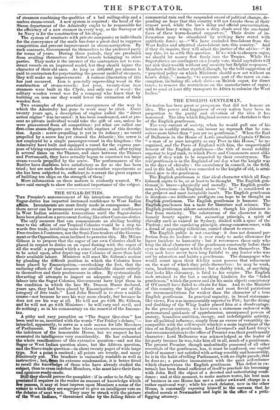THE SUGAR-.DUTIES.
THIS Premier's announcement of his intentions respecting the Sugar-duties has imparted increased conlid.ence to West Indian affairs. InVestments are more freely made in consequence. But there never can be permanent average steadiness and confidence in West Indian mercantile transactions until the Sugar-duties lave been placed on a permanent footing like other Customs-duties.
The only measure that can communicate an abiding healthy tone to the affairs of our Tropical Colonies would be a step to- wards free trade, involving more direct taxation. But neither the Free-traders it l'outrance, nor the Semi-Free-traders of the Govern- ment or the Opposition, seem inclined to perceive this. Mr. Milner Gibson is to propose that the sugar of our own Colonies shall be placed in respect to duties on an equal footing with the sugar of all the world.: a proposal which a sense of common justice forbids to be acted upon, after depriving our Colonies of more than half their available labour. Ministers will meet Mr. Gibson's motion by pleading the difficult position in which the Colonies have been placed by Emancipation,--overlooking the fact, that the enchusng effects of that measure are attributable almost entirely to themselves and their predecessors in office. By systematically thwarting all attempts to import an adequate supply of free labour into the Sugar Colonies Government have kept them in the condition in which the fate Mr. Deacon Hume declared, years ago, they had been placed by Emancipation—" out of the category of free trade." Lord John Russell is to steer a middle course—not because he sees his way more clearly, but because he does not see his way at all. He will not go with Mr. Gibson, and he will not go with Ministers : he will carp and cavil, and do nothing ; as in his commentary on the renewal of the Income- fax.
A pithy and racy pamphlet on "The Sugar Question" has been sent to us, inscribed with the words " For-Friday's debate,"--- intended, apparently, to serve as a rade mecuin for idle Members of Parliament. The author has taken accurate measurement of the indolence of the honourable House, but we suspect he has overrated its intelligence very considerably. He has exhausted the whole ramifications of this extensive question—and not the Sugar or West Indian question alone, but the African question, and the Slave-trade question—in about twenty pages of wide large type. Not a point 15 omitted ; all points are tersely, and many felicitously put. The brochure is eminently readable as well as instructive; .but,ilhoni its extreme condensation it is better fitted to recall the knoiledge of those who have already studied the subject, than to cram indolent Members, who must have their facts and opinions ready-made. Still they should peruse the pamphlet : if in order to be fully ap- preciated it requires in the reader an amount of knowledge which few possess, it may at least impress upon Members a sense of the extent to which they are unprepared to give an intelligent vote on the debates of next week. They- may be struck with the picture o ,debates
West Indians, "threatened a Ike by the falling fabric of
Commercial ruin and the suspended sword of political change, de- pending on hope that this country will not forsake them at their utmost need, while the law's delay and official procrastination, with their heavy wings, throw a deep shade over the sun-burnt faces. of these warm-hearted supporters." Their desire of in- formation may be stimulated by striking Acts stated with antithetic force; as—" We have excluded free-labour from the West Indies and admitted slave-labour into this country." And if they do inquire, they will admit the justice of the advice—" At any rate, let us settle this question. If we wish to cheapen sugar, we should let money flow freely into the Tropics. While the Sugar-duties are contingent on a yearly vote, timid capitalists will not risk their wealth without any security but Delphic responses." Members will be rather startled, though, by the bold suggestion of "practical policy on which Ministers should now act without an hour's delay,"—namely, "to commute part of the taxes on con- sumption, including- the whole duties on -British stis'ar„ for direct taxes ; to remove the restrictions on the manufactures of sugar ; and to send at least fifty transports to Africa to colonize the West Indies."


























 Previous page
Previous page